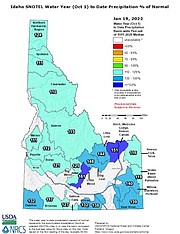Our Gem: Snowpack and water supply outlook for 2022
Mountain snowpack is one of the main components to water supply for the Coeur d’Alene River basin and the Idaho Panhandle. Although any precipitation is welcome, not all types of precipitation behave the same. Rainfall tends to increase runoff quicker into the rivers and lakes, compared to mountain snow that provides a longer storage of water in the winter and releases it as runoff in the spring and summer months.
Since last May, drought has gripped the Idaho Panhandle due to the lack of spring precipitation. The drought peaked by August with what is known as a D4 Exceptional Drought, as depicted in the U.S. Drought Monitor, across much of the region due to the persistent dryness and record heat. This drought impacted agriculture, stream flows and the fire season across North Idaho. Thanks to the autumn precipitation, drought conditions have seen a slow steady improvement, yet precipitation deficits of 2 to 5 inches remain when looking at the last 9 to 12 months across the Coeur d’Alene River basin.
Precipitation has been above seasonal levels since September. Over the last three months, it has ranged up to 130% of normal across the headwaters of the Coeur d’Alene River basin. This year’s winter snowpack had a slow start due to the warmer than normal temperatures in October and November that led to higher snow levels. Fortunately, cooler temperatures arrived by mid-December which helped jump-start the building of the mountain snowpack.
Mountain snowpack is monitored by automated sensors in the Snow Telemetry (SNOTEL) Network with the National Resources Conservation Services (NCRS). There are several SNOTEL sites in the upper Coeur d’Alene basin that are used to monitor the high elevation snow. These sites include Sunset (5,540 feet), Humboldt Gulch (4,250 feet) and Lookout (5,190 feet). Current readings show improvements in December with the river basin average of snow water equivalent near 120% normal by early January.
Water supply forecasts are updated by the National Weather Service (NWS) River Forecast Center and are based on trends in temperature, precipitation and snowpack. There are several forecast points in the Coeur d’Alene River basin, although for water supply, Enaville and Coeur d’Alene Lake are the top two sites. At this time, the outlooks appear optimistic for the water supply for 2022 with current levels just above 100% of normal.
According to the NWS Climate Prediction Center, this year’s seasonal winter outlook is based on a La Niña forecast which favors above-normal precipitation and below normal temperatures for the Inland Northwest for January through March 2022. Keep in mind, not all La Niña’s are the same and other factors come into play that can affect our winter weather. Local studies have shown that La Niña seasons bring near to above normal snowfall not only to the mountains but most of the valley locations. In addition, there are increased chances of elevated river flows and flooding during La Niña events especially if the snowpack melts off too quickly. It’s important to stay current on winter weather and the weather updates. Please visit National Weather Service Spokane at www.weather.gov/Spokane for the latest weather forecasts and warnings.
Getting current snow and precipitation reports is important. There are ways that weather enthusiasts can help by sharing reports. It’s through the Community Collaborative Rain, Hail and Snow Network where volunteers of all ages and backgrounds work together to measure and map precipitation. Learn more and join the network at www.cocorahs.org.
• • •
The Our Gem Coeur d’Alene Lake Collaborative is a team of committed and passionate professionals working to preserve lake health and protect water quality by promoting community awareness of local water resources through education, outreach and stewardship. Our Gem includes local experts from the University of Idaho Community Water Resource Center, Coeur d’Alene Tribe Lake Management Department, Idaho Department of Environmental Quality, Kootenai Environmental Alliance, Kootenai County and CDA 2030.





